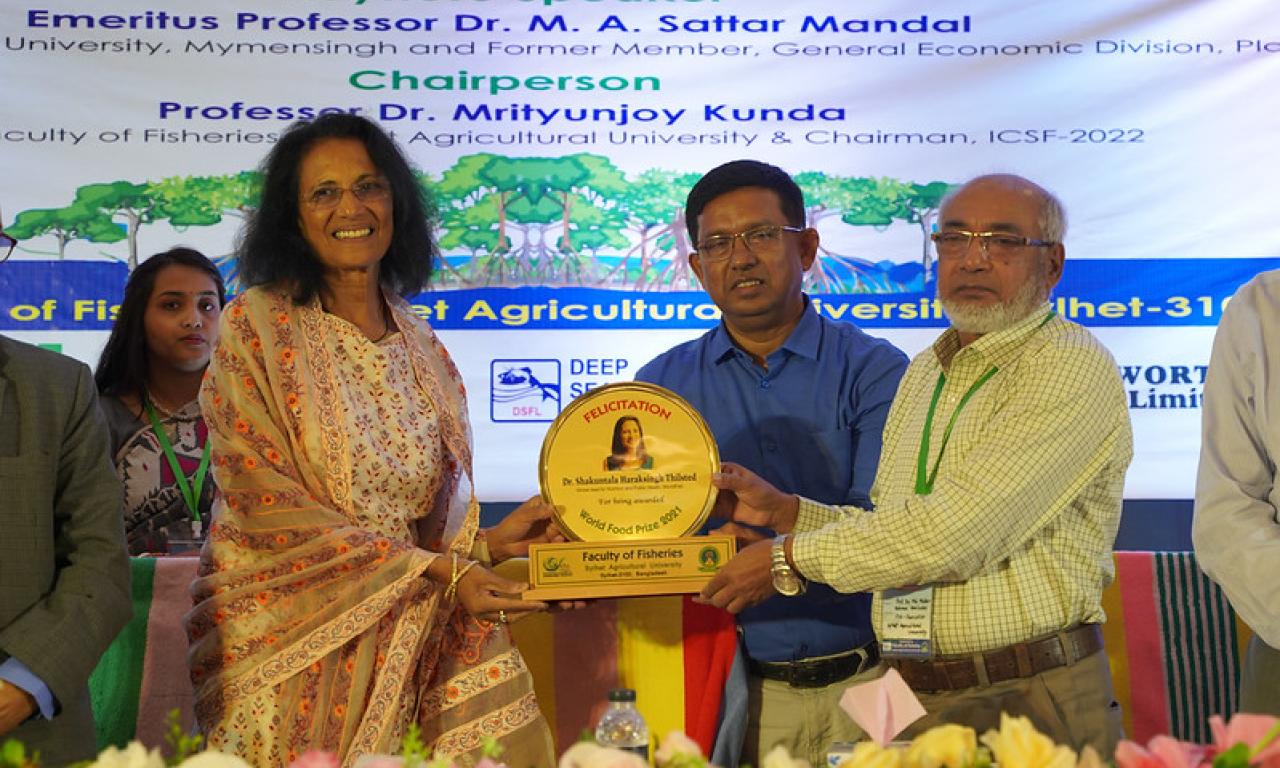
- Shakuntala Haraksingh Thilsted was recognized at the recent International Conference on Sustainable Fisheries (ICSF) for her contributions to developing holistic, nutrition-sensitive approaches to aquatic food systems.
- She is determined to do more work on indigenous small fish species with Sylhet Agricultural University, which presented her with the award.
- She suggested that the university research team work on other important nutrient-rich small fish like dhela and darkina, alongside mola.
Shakuntala Haraksingh Thilsted, global lead for nutrition and public health at WorldFish and the 2021 World Food Prize Laureate, was recognized at the recent International Conference on Sustainable Fisheries (ICSF) for her pioneering research, critical insights and landmark innovations in developing holistic, nutrition-sensitive approaches to aquatic food systems.
“Her research on small fish, which started in Bangladesh, will play an effective role in solving the nutritional deficiency not only in this country but also the world,” said Md. Matiar Rahman Howlader, the vice-chancellor of Sylhet Agricultural University (SAU) after presenting Thilsted with the award in honor of her contribution to promoting the nutrient-enriched endangered fish mola (Amblypharyngodon mola) in pond aquaculture in Bangladesh and beyond.
Organized by SAU, the aim of the conference held from 16 to 18 September 2022 was to share thoughts and ideas on fisheries and aquaculture. Mrityunjoy Kunda, the dean of the Faculty of Fisheries at Sylhet Agricultural University, was the chairperson of ICSF and also part of Thilsted’s research team working on indigenous small fish species from 2003 to 2008.
"Her receiving the World Food Prize is like an award for me, my colleagues and Bangladesh because we started this research in this country under her supervision,” recalled Kunda when he conducted research on small fish together with Thilsted.
Continuing the work on indigenous small fish species

Thilsted, who was the keynote speaker for the plenary session on the second day, expressed her determination to do more work on indigenous small fish species with SAUwhile thanking the university for inviting her to the conference and honoring her work.
She suggested that the university research team work on other important nutrient-rich small fish like dhela (Osteobramacotio) anddarkina (Esomusdanricus), alongside mola.
In addition to delivering her keynote on ‘Aquatic Food System for Nourishing People and the Planet’, she was also the chair of the ‘Socioeconomic, Livelihood and Gender’ session where eight scientific papers were presented.
On the sides of the conference, Thilsted was interviewed by ATN News and Channel 1 where she elaborated on her work with indigenous small fish that were rich in bioavailable vitamins, minerals and essential fatty acids – crucial for the cognitive development of children in the first 1,000 days of their lives.
“When small fish is eaten whole, including its head, bones and viscera, all the nutrients can be taken. When we consume only the flesh of larger fish, the nutrient composition we receive is different – it is not as complete as that found in smaller fish,” shared Thilsted.
